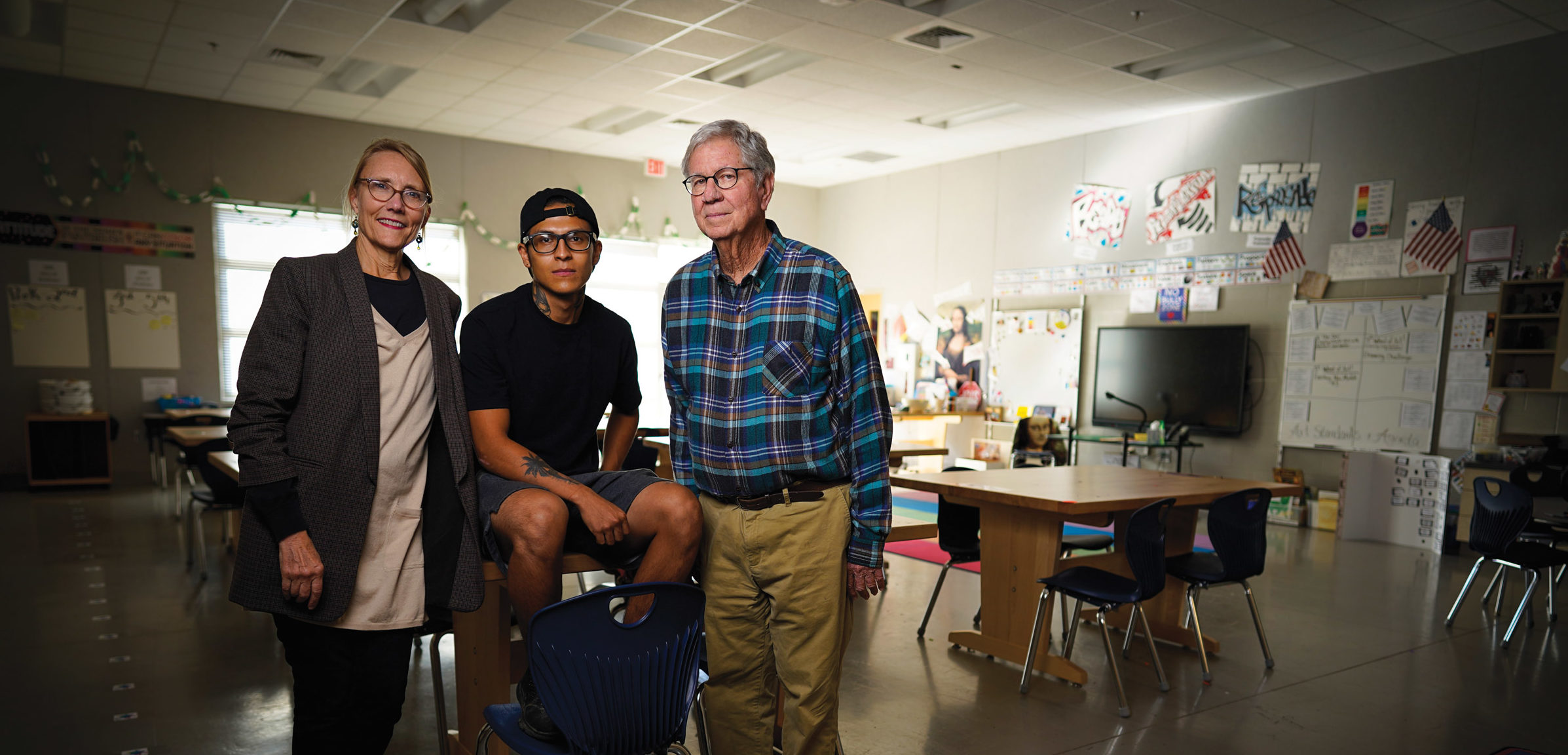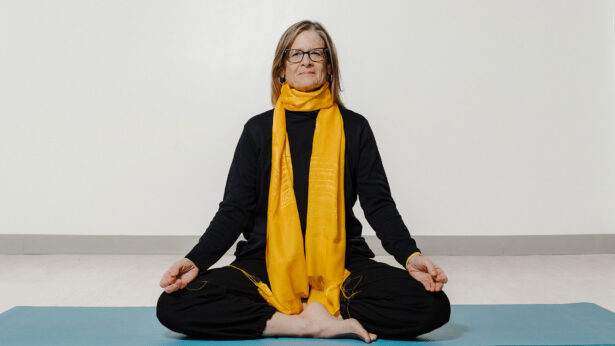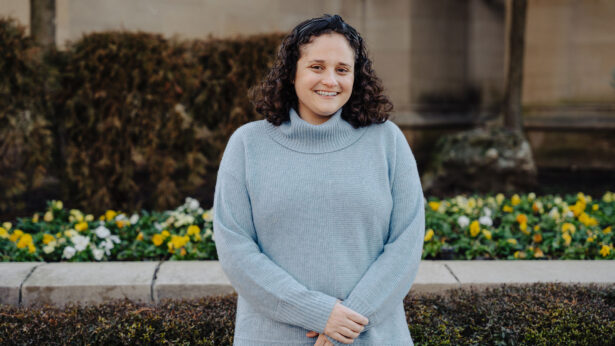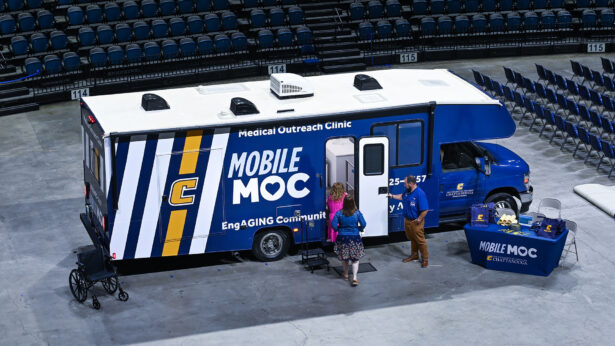Featured photo: Karen Holst, Pond Gap Elementary coordinator, Christopher Almanza, former Pond Gap Elementary student, and Bob Kronick, UT Knoxville professor of educational psychology and counseling, believe in the power of community schools.
By Brian Canever | Photos by Patrick Murphy-Racey
The memories rush back to Christopher Almanza as he watches a half-dozen Pond Gap Elementary students flip and tumble on blue mats in the school’s basement. Behind him, an after-school teacher—Shift Two, as they’re called by the school’s administration—helps a boy balance himself on a ball like a circus performer. Others in the back practice rolling across the room on wooden spools without falling.
“I never missed a circus class,” Almanza says. “I fell off the unicycle once. But I still came. You could express yourself here.”
When he was a student here a decade ago, Almanza wasn’t sure why they did circus acts at school. He only knew he enjoyed it, like he enjoyed talking to the professor who walked the halls followed by dozens of other adults—some teachers, others UT Knoxville students—who descended upon Pond Gap weekday afternoons after the final school bell rang.
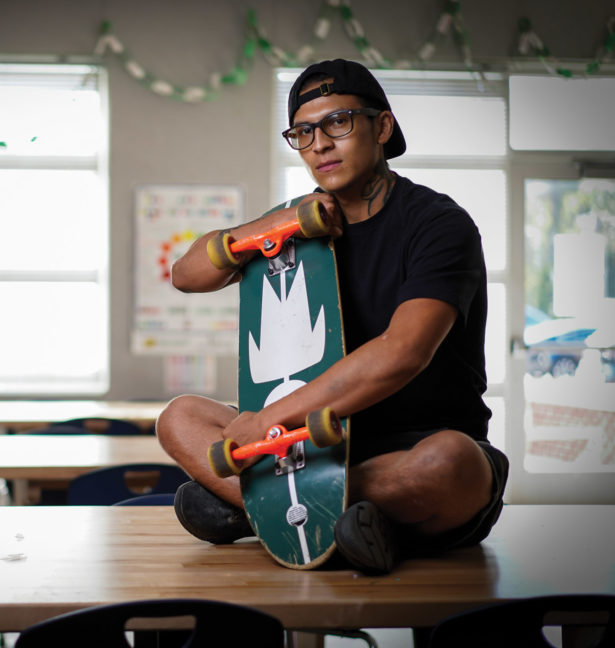
This is what Almanza learned later. In 2009, around the time Almanza was starting third grade at Pond Gap, two men—Bob Kronick, a UT Knoxville professor of educational psychology and counseling, and Randy Boyd, (Knoxville ’79) a businessman now serving as the UT System interim president—made a decision that would fundamentally change education for children in two of Knox County’s urban schools. Kronick and Boyd launched University-Assisted Community Schools (UACS), an initiative to provide children with academic support services, physical education, music and art programs after regular school hours.
“My model was simple: Start where the need is the greatest,” says Kronick, who serves as director of UACS.
The initiative started at Pond Gap and in 2015 expanded seven miles north to Inskip, another school designated Title I by the state for its high-poverty rates.
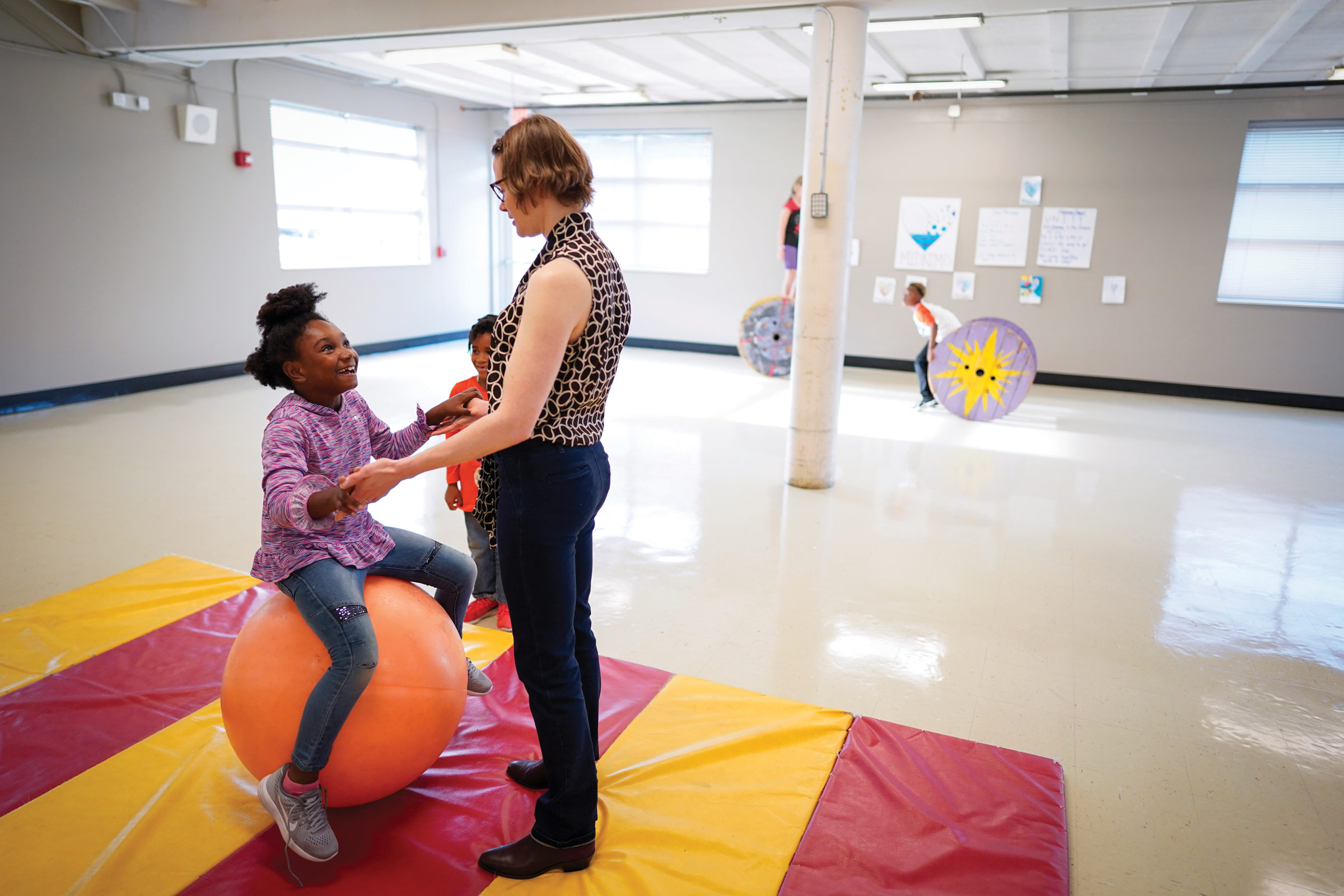
UACS continues to provide students with 170 yearly hours of tutoring and 170 hours of enrichment programs, from Harry Potter-themed reading clubs to vegetable gardening. Two on-site coordinators—Karen Holst at Pond Gap and Blaine Sample at Inskip—organize hundreds of volunteers from the university and the surrounding community who walk hand in hand with the students in hopes of helping them on a path to success.
Their impact has been substantial. During the 2017-18 academic year at Pond Gap, where nearly one-third of students participate in UACS after-school activities, students showed learning gains in reading and had significantly higher gains in math compared to students who did not participate. At Inskip, the numbers are similar: significantly higher learning gains in math and significantly fewer absences and behavioral referrals compared to other students. On top of tutoring and enrichment programs, the initiative also meets physical needs, serving more than 10,000 snacks and dinners to
its students.
Almanza is only one of hundreds of young people who have benefitted from the UACS’s presence at Pond Gap. In 2018, he graduated from West High School. But, after football practices his junior and senior years, he’d return to Pond Gap, where his youngest brother still attends school, to volunteer as a tutor.
“If you really want to help people, you need to go into the community,” Almanza says. “I learned that from Mr. Kronick.”

The idea to work in Knoxville’s elementary schools came to Kronick in 1989 on a long drive home from Pikeville, Tennessee, where he worked for many years with teenagers in the criminal justice system. That morning he had met three boys from Knoxville who had murdered a homeless man in Tyson Park. He recognized their names.
“They were in my daughter’s class at school,” Kronick remembers. “I realized then that I needed to get to kids before the Department of Corrections did if they were going to have a chance.”
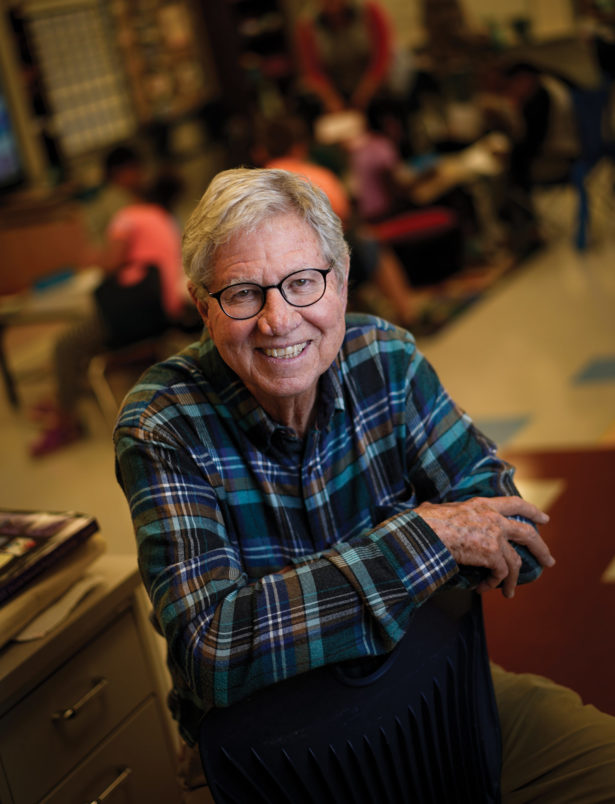
Influenced by the community-schools movement of the late 19th and early 20th centuries, Kronick developed a model to transform local schools into resource hubs, meeting the educational, medical and social needs of their communities through the backing of the local university.
“If you want to fix education in America, you’ve got to focus on the noncurricular needs of children,” Kronick says. “School buildings are empty at 3 p.m. You don’t want these buildings open and nobody in them. I could use the buildings.”
That’s the case Kronick made to then-Knox County Superintendent Charles Lindsey, who told him to pick where he’d like to start. In 2000, the first university-assisted model launched at two magnet schools, Sarah Moore Greene and Green, then expanded over the next decade and a half. For his project to work, Kronick relied on the help of UT students eager to take their learning experience outside of the classroom.
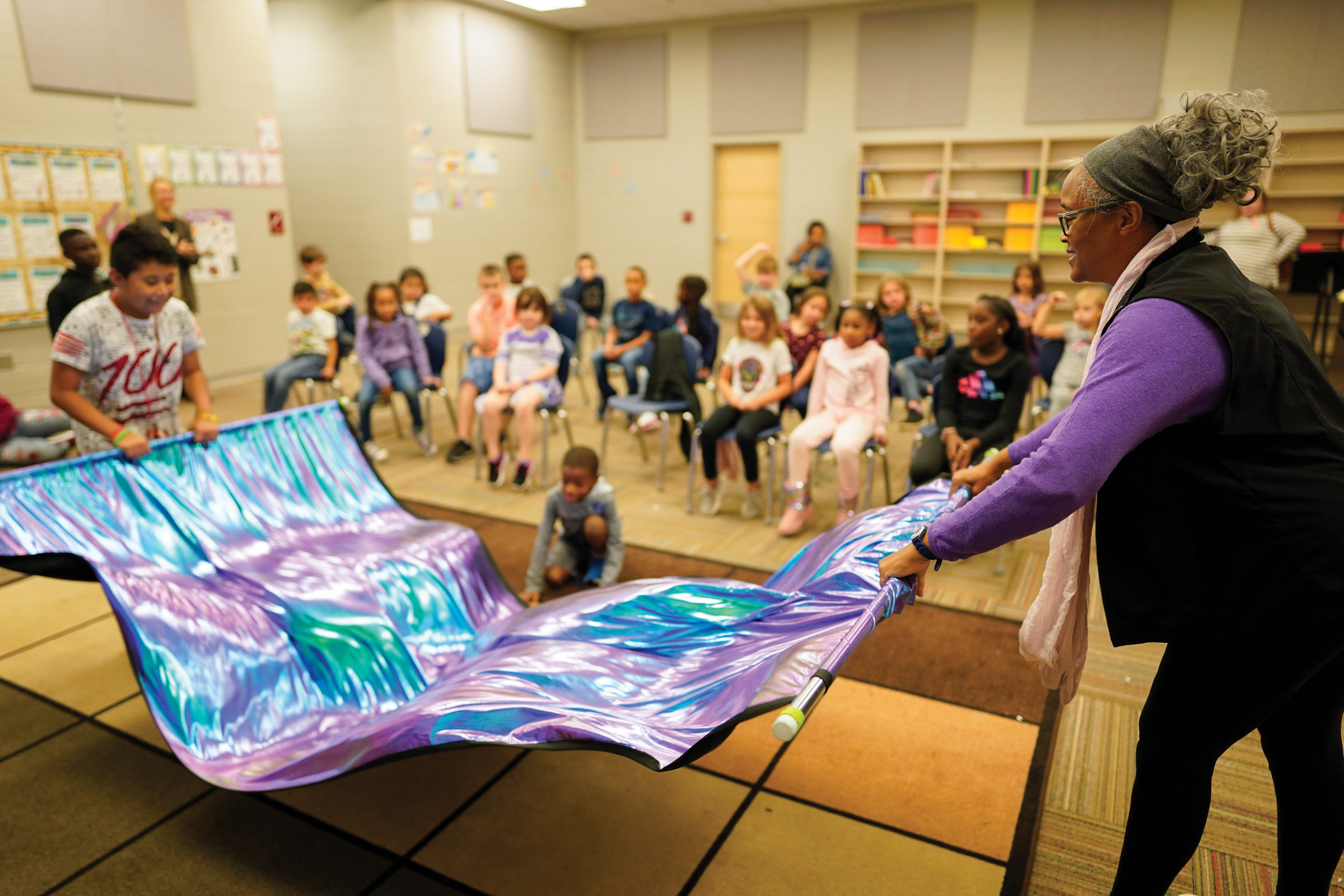
One of Kronick’s early volunteers was Jamie Coble, who earned a bachelor’s, master’s and doctorate from UT Knoxville before joining the faculty in 2013. Nine years earlier, Coble took a university honors course with Kronick. As part of the class, she volunteered at Green.
“Before people started talking about experiential learning, that’s what we were doing in Bob’s class,” says Coble, now an associate professor of nuclear engineering.
Kronick hired Coble in 2005 to serve as his volunteer coordinator for Sarah Moore Greene’s after-school program while she completed her master’s degree. Coble’s role, which was in a volunteer capacity because she refused to be paid for it, paved the way for the positions later designed for Sample and Holst. For four years, she organized an hour of homework help with UT student volunteers and ran the Science Club, where the children once tried to make the Guinness Book of World Records for most Jell-O eaten using chopsticks.
“It was fun—and a huge mess,” Coble says. “But it was how we gave back as volunteers. Nuclear engineers cannot go out in the community and build a nuclear reactor. Scientists and engineers could give back outside the classroom through what we were doing.”
Gallery: Children and parents learn new recipes during culinary classes in an outdoor kitchen.
Even now, Coble remains involved. She coordinates the nuclear engineering department’s UACS volunteers, who go to Pond Gap and Inskip to read to students about nuclear power through books like Marie’s Electric Adventure.
Several other UT programs put dozens of volunteers on the ground every week. Haslam Scholars, an honors program that aims to develop civically engaged scholars, places 30 students every year at both Pond Gap and Inskip, with a minimum of 15 required service hours a semester. “These are the best and brightest at UT,” says Sylvia Turner, associate director of Haslam Scholars. “We see where education has taken them. Why not give back in that same way?”
Since 2014, the scholars have started some of the UACS’s most popular clubs, including Lego League, Dungeons and Dragons, Science Saturday and Cultural Saturdays, where students explore the world through different languages, games and the traditions of other nations.
“Before people started talking about experiential learning, that’s what we were doing in Bob’s class,” says Jamie Coble.
“One of the biggest impacts for our kids are the relationships they get to form through the different UT programs,” says Trina Bruns, principal of Pond Gap Elementary. “The fact that somebody else cares about their success—a college student. That is huge.”
One of these students is Margaret Murr, a third-year audiology and speech pathology major from Farragut, who was introduced to Pond Gap through 1794 Scholars, a UT honors program.
Although she mostly volunteered during Girls Inc. and sports clubs on Fridays, Murr fit in wherever she was needed.
“Sometimes you go volunteer at places, and you feel like you’re just standing there,” says Murr. “Here, there’s always someone guiding you. It’s like organized chaos. And, as you keep going, the kids remember you. If you skip a week, they notice.”
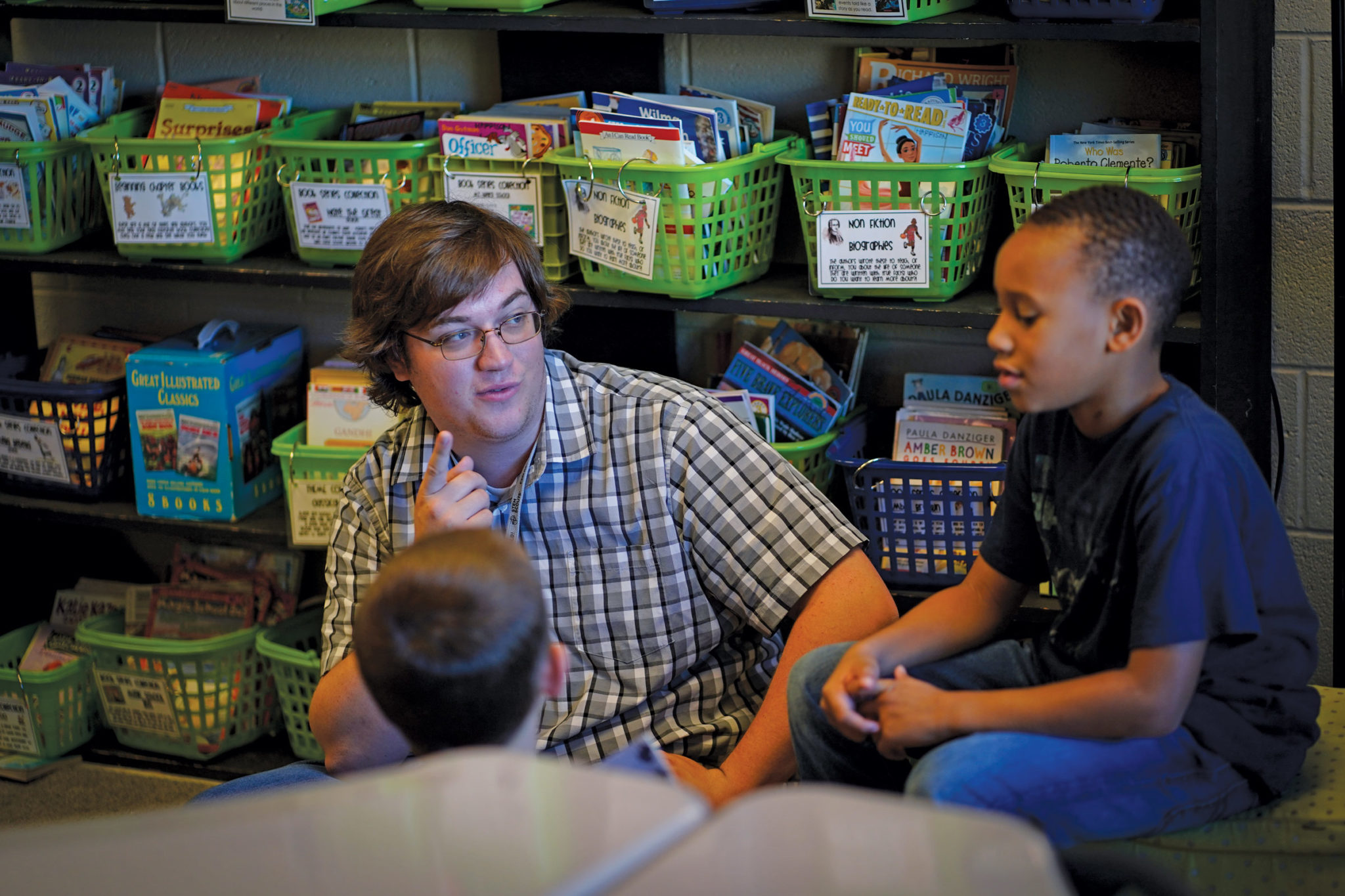
Kronick keeps a presentation Murr made about volunteering at Pond Gap tucked in the corner of his office: “University-Assisted Community Schools: The Importance of Relationships.” That is what Murr took away from her time at Pond Gap—the children who squeezed her hand, pelted her with questions and spilled their hearts every Friday afternoon.
One day, during a regular afternoon drawing class, a group of children asked Murr where she lived. She knew saying a dorm room would not mean much. So, she explained. “I live in a small room in a big building. I share a room and a bathroom with a roommate.” One of the boys nearby said calmly: “That sounds like where my mom lives.” Curious, Murr asked what the boy meant. “My mom is in jail,” he said.
Murr was struck.
“That’s when I realized why this program matters,” Murr says. “I’ve lived 15 miles away my entire life, and I didn’t know the need that was right here. I’ve gained a new appreciation for the value of education.”

In 2009, the first time Kronick walked into Boyd’s office, Boyd told him about his idea to raise $2 million to open a charter school.
Kronick’s response was blunt: There were already enough buildings. Making a difference in children’s lives would require leveraging the facilities that already existed to provide broader support in at-risk communities.
Boyd was in for whatever Kronick suggested.
“In the Boy Scouts, we have a code of the outdoors,” says Boyd, who spent 17 years as a scout leader. “Basically, leave every trail better than you found it. Education was the best way for me to live that metaphor.”
Initially, Boyd agreed to fund UACS for three years. Within a year, he recommitted another $450,000. Now, he says, Kronick will call from time to time to ask whether he will renew his pledge. Boyd’s response is short, like Kronick’s a decade ago.
“I’m in this for life,” Boyd says. “There’s few things I believe in more.”
Since Boyd’s initial commitment, other organizations have become involved in funding or sponsoring different aspects of the UACS. United Way has awarded $350,000 in three-year increments. Dow Chemical funded an outdoor classroom. Krystal’s provides Tupperware. The Knoxville Racquet Club has donated tennis shoes. The list of supporters and partners is long.
Through the funding provided by the Boyd family and United Way, UT Knoxville hires approximately 35 part-time positions—the Shift Two staff—to support Holst and Sample. The staff’s work is so closely tied to the school’s mission that many Knox County teachers stay after the school bell rings to work part time with UACS through a 21st Century Community Learning Centers grant the initiative receives from Tennessee’s Department of Education.
“Our Shift Two teachers have these amazing and diverse background experiences, which are really neat when paired with what our Shift One teachers bring,” Bruns says. “You will not find better people to care for your children.”

Roger Innis runs the Boys to Men program at Pond Gap during the day. Developed by Bruns and her predecessor Shelly McGill, it supports nearly 60 children who display anger or behavioral issues.
“It’s a safe zone for the kids,” Innis says.
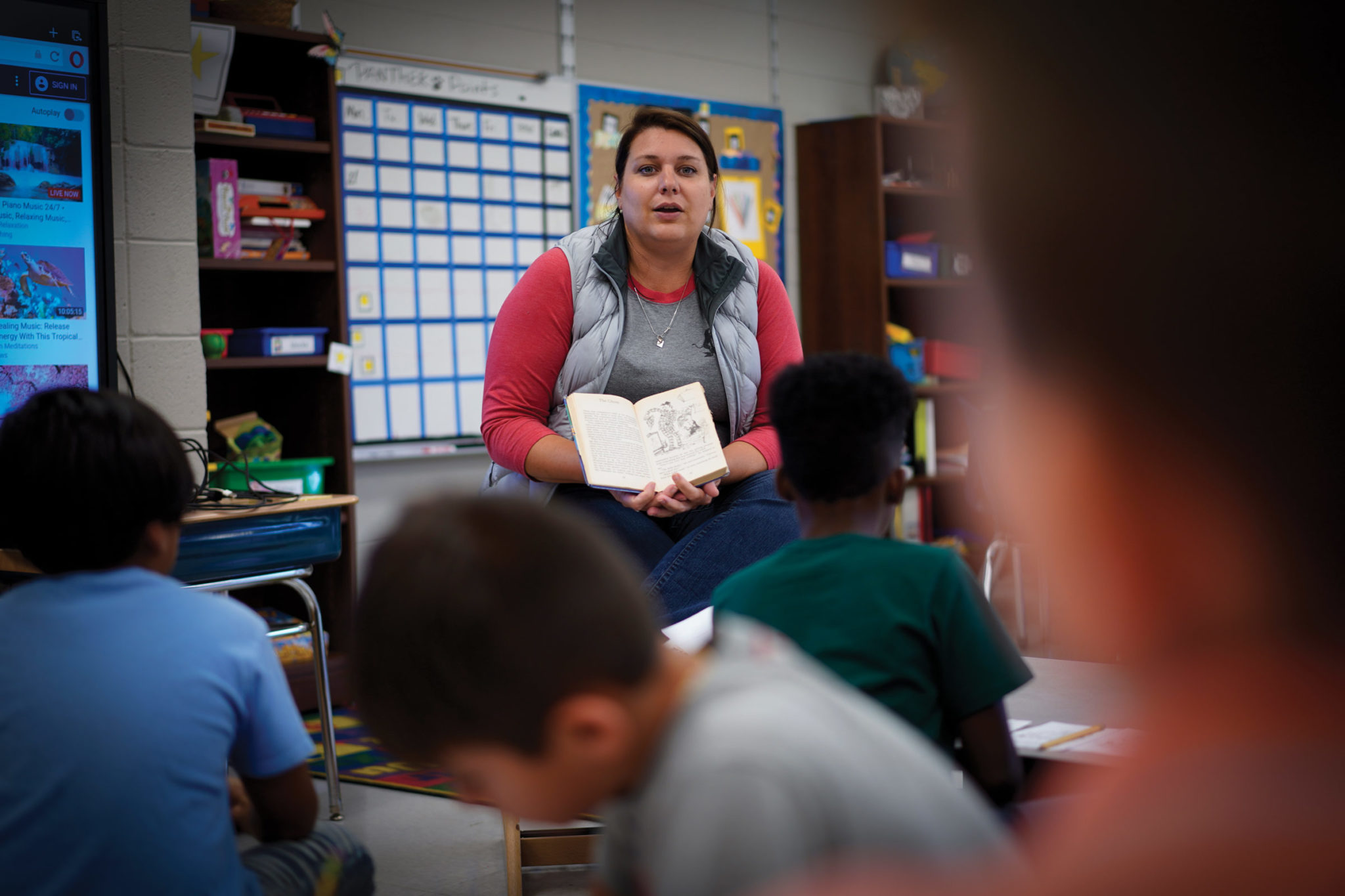
When they don’t want to talk, he takes out a pack of cards and starts dealing. Or he takes them into the gym to shoot basketball. Eventually, many of the children open up.
“I knew I wasn’t going to be a teacher,” Innis says. “But I understand these kids are going through hard situations. Maybe they didn’t eat the night before or their lights were cut off, and that’s why they’re so angry. I listen and talk to them.”
After school, Innis, who has an associate’s degree from Pellissippi State Community College and thinks he may pursue a career in social work, is Pond Gap’s after-school assistant coordinator—a natural extension of his daytime work.
For Innis, Murr and Kronick, it’s the relationships that matter most. It is the image of a girl graduating from high school and returning to Pond Gap to walk the halls in her cap and gown, of Almanza turning in a UACS job application this past October to mentor neighborhood children, of a mom and her daughter cooking a meal together in a culinary class led by UT Knoxville science majors and education students.
Kronick and Boyd have spent the past decade working with students in urban environments. However, they both recognize that many of the same quality-of-life disparities seen in places like Pond Gap and Inskip are mirrored in Tennessee’s rural communities. Within the next year, they plan to start a new program in Sunbright, extending the UACS vision of schools as places to learn, play and engage with the world farther across the state.
“I think the challenges are greater today than they were back when I first started,” Kronick says. “But, if we can use education to teach kids they can do something with their lives, we can deal with it.”
